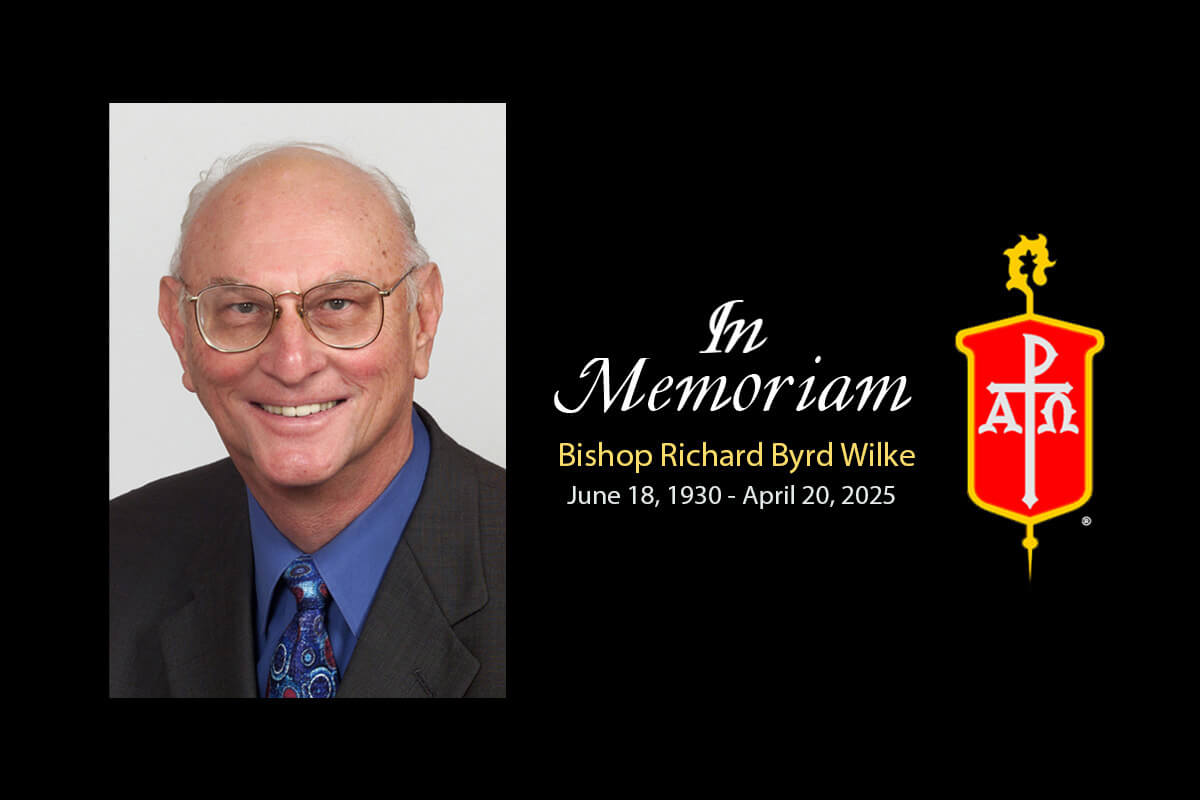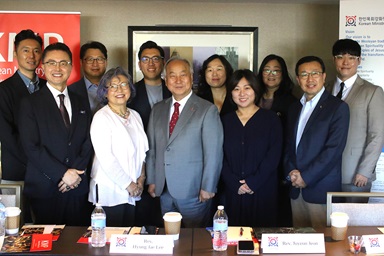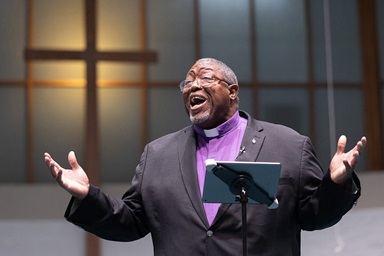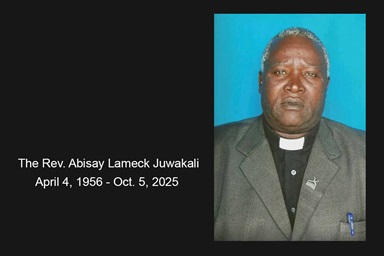Key points:
- Bishop Richard Wilke and his wife, Julia, developed the popular Disciple Bible Study series while he served as episcopal leader in Arkansas.
- His work helped millions around the globe delve deeper into Scripture. He was also a voice for LGBTQ inclusion in The United Methodist Church.
- Bishop Richard Wilke died April 20, Easter Sunday, surrounded by family at age 94.
- His four children are working together to help Disciple Bible Study reach new audiences today.
As a newly elected bishop in Arkansas, United Methodist Bishop Richard Byrd Wilke hoped to overcome years of declining church attendance by helping people grow in faith and community.
That evangelistic zeal led the bishop, who went by Dick, and his wife, Julia, to develop the popular Disciple Bible Study series, which led millions of people around the world to delve deeper into Scripture.
After his retirement, he also became a voice for full LGBTQ inclusion in the life of the church — believing Jesus’ teachings, expressed in the Bible, direct Christians to create a loving and inclusive community of faith.
He died just as the sun began its rise April 20, Easter Sunday, in Winfield, Kansas, surrounded by family. He was 94.
“He died very peacefully,” said his oldest son, Steve Wilke, Ph.D. “The first thing that went through my mind was the little line in the Easter story, ‘before it was light, the women went to the tomb.’ And so right before daybreak, he passed away.”
His family saw his death coinciding with the celebration of Christ’s resurrection as fitting. All four of the bishop’s children — Steve, Paul, Susan Wilke Fuquay and Sarah — stressed how much love for Jesus guided their father’s life and ministry.
The family also marveled that he died on the 24th anniversary of the founding of the Richard and Julia Wilke Institute for Discipleship, housed on the campus of United Methodist-related Southwestern College in Winfield. The institute, which continues to offer online courses on Christian faith matters, was founded with funds from the sale of Disciple Bible Study. Steve Wilke is the institute’s executive director.
Memorial arrangements
Wilke was preceded in death by his wife in 2016 and his sister, Beverly, in 2019. His survivors include the 39 members of his immediate family: four children and their spouses, Steve (the Rev. Beth), the Rev. Paul (Janelle), Susan Fuquay (the Rev. Rob), and Sarah (Nancy Kruh); nine grandchildren and their spouses; and 13 great-grandchildren.
Read the family obituary
The Rev. Paul Wilke, a retired United Methodist pastor, recalled asking his father a few years ago what the retired bishop thought about heaven.
“His answer was just crystal clear,” his son said. “His answer was, ‘I don’t know, Paul, but what I know is that Jesus is alive.’”
He spent his life helping others to get to know the living Christ better, especially through the Scriptures. Altogether the four editions of the Disciple Bible Study series have been taken more than 3 million times in all 50 states and multiple countries outside the U.S. It also has been translated into several languages, including Spanish, Russian, German and Mandarin Chinese.
The Wilke family has received countless letters of lives transformed through the Bible studies — people discerning their calls to ministry, prisoners turning their lives around and people just being willing to show up at church in the first place.
Scott Brewer, now executive director of the Great Plains Conference where the bishop spent his retirement, said he thinks Disciple Bible Study had a profound impact on the whole United Methodist Church.
Brewer previously oversaw data services for the General Council on Finance and Administration and pointed out that United Methodist churches’ attendance grew in the 1990s. That’s also when Disciple Bible Study was at its peak in popularity.
“I don’t think that it is entirely coincidental that it was also the time that Disciple Bible is going on,” said Brewer, who credits the Bible study with increasing his own biblical literacy and enriching his faith. “If I try to think back to those days, what else would have been happening in The United Methodist Church that would have been so pervasive across the full stretch of the denomination?”
Neil Alexander, retired publisher and president of the United Methodist Publishing House that published and distributed Disciple Bible Study, shared a similar sentiment.
“Dick and Julia Wilke helped to reinvigorate how United Methodist people respond to God’s call to live and love like Jesus,” he said.
The bishop and his wife’s legacy also includes their four children who each have spent their careers serving The United Methodist Church in various ways. All four are working together to bring Disciple Bible Study to new audiences as an app for the digital age.
“He said it over and over, ‘My greatest joy is my kids are keeping Disciple going,” said Susan Wilke Fuquay, a Christian educator who developed the Disciple Fast Track to make the study more accessible.
“But even more joyful, I think, than that, was that we were all working together.”
At 16, the future bishop gave his life to Jesus and never wavered in his sense of calling, his youngest daughter Sarah Wilke said. She previously was publisher of the Upper Room devotionals and executive director of the United Women in Faith-owned Scarritt Bennett Center in Nashville, Tennessee.
As confident as the bishop was in preaching and exuberant in sharing the Gospel, she and her siblings also remember seeing their father kneel beside his bed each night to pray and humble himself before God.
“If I were to say anything to The United Methodist Church, it would be that the gift my father gave was an absolute focus on loving Jesus,” she said.
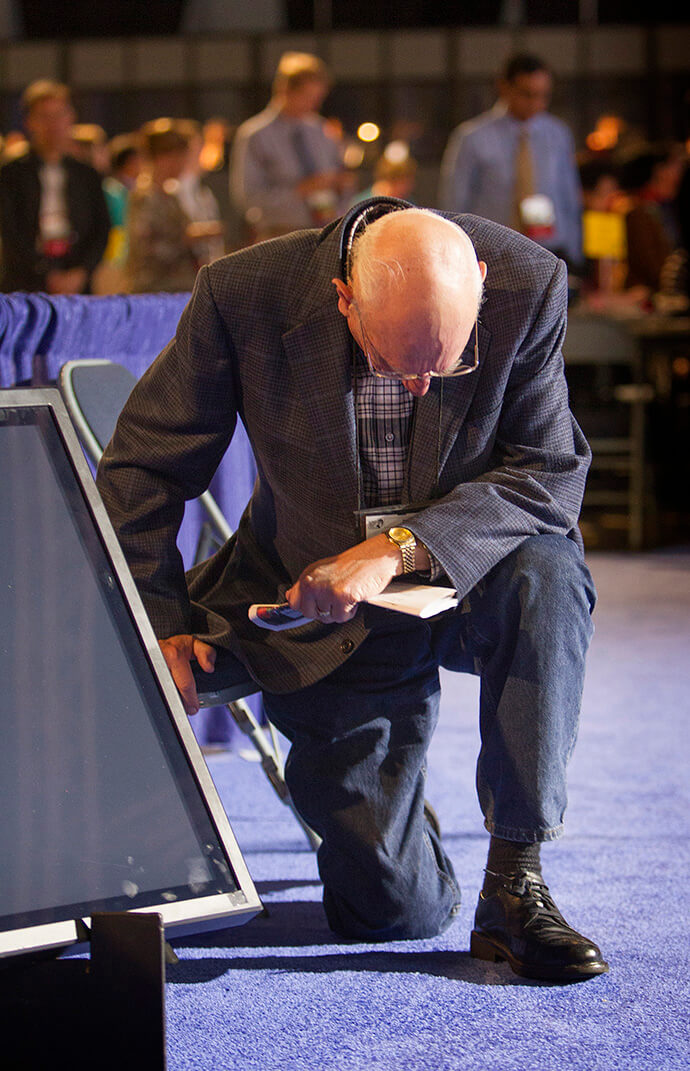
The bishop was born on June 18, 1930, in El Dorado, Kansas, to Clarence, a funeral director, and Pearl Byrd Wilke. He graduated with a degree in history from Southern Methodist University, where he was a champion debater, student body president and Phi Beta Kappa.
While at the Dallas university, he met Julia Kitchens of Texarkana, Texas. The two wed on June 20, 1953, and for more than 60 years, they remained partners in ministry until Julia’s death in 2016.
Two years into his marriage, he earned his Master of Divinity from Yale University where he also received a senior preaching award.
Over the next 30 years, he established a reputation in Kansas for revitalizing and expanding congregations, first serving Scandia United Methodist Church, then Pleasant Valley United Methodist in Wichita, University United Methodist in Salina and then as district superintendent.
Along the way, he earned a second Master of Divinity — this time with a focus on pastoral care. He graduated summa cum laude from Dubuque Theological Seminary in Dubuque, Iowa, in 1972. The seminary awarded him an honorary doctoral degree in 1994.
With his second master’s in hand, he was appointed senior pastor at First United Methodist Church in Wichita. In his 11 years in that pulpit, he initiated televised services that reached central and western Kansas, and under his leadership, the church developed a singles ministry with 500 participants and an adult Sunday school program with an 800-member enrollment.
He also became a prolific author, publishing “Pastor and Marriage Group Counseling” (1974), “Tell Me Again, I’m Listening,” and“Our Father” (1978). All his books were released by the United Methodist Publishing House.
While at First United Methodist, he was elected bishop in 1984. He was assigned to lead United Methodists in Arkansas for the next 12 years until he reached mandatory retirement in 1996.
In Arkansas, he made church growth and evangelism his priorities. In 1986, he published “And Are We Yet Alive?,” a best-selling analysis of why the church was losing membership. Among the recommendations of the book named for a famous Charles Wesley hymn was a more in-depth study of Scripture.
The United Methodist Publishing House invited Wilke to help make that study a reality. The result was the first “Disciple Bible Study: Becoming Disciples Through Bible Study.”
The Wilkes created a blueprint that included daily reading, videotaped lectures by biblical scholars and perhaps, most significantly, weekly get-togethers in small groups.
Subscribe to our
e-newsletter
As a pastor in the 1980s, the bishop later recounted on the Discipleship Bible Study website, “I became aware how isolated and lonely people were becoming and how ignorant they were of the Bible.” He found Sunday school lessons were limited in reach, but then he remembered how John Wesley reached busy, working people through class meetings.
It was an idea that could be applied to Bible studies, where instead of teachers, there would be “facilitators,” whose job was to help facilitate discussion and prayer.
The leadership training program and multimedia resources that engaged people’s heads and hearts over 34 weeks “stands out in UMPH’s 236-year mission to produce and deliver quality resources that advance the cause of Christianity,” Alexander said.
Retired Bishop Janice Riggle Huie, who succeeded Wilke as bishop in Arkansas, speaks with gratitude that the Disciple Bible Study was accessible to churches of all sizes. She speculates that his experience in Arkansas helped him expand beyond the big churches that frequently invest in Bible study series.
“He understood how important it was to teach the Scriptures to people in little bitty churches stuck way back in the hills and hollers,” she said.
Retired Bishop John L. Hopkins, who was elected in 1996 the same year Wilke retired, first got to know the older bishop’s work as a pastor at Methodist Temple United Methodist Church in Evansville, Indiana. Hopkins discovered more than 200 members had completed the Disciple Bible Study, with three to five new groups formed each year by Jim Coy, a layman in the first training class.
After he retired, Bishop Wilke moved back to Kansas, where he was bishop-in-residence at Southwestern College in Winfield. His son Steve was the college’s dean of students at the time. But even in this second life, Hopkins recalls the bishop calling him to tell him how the Disciple study changed a person’s life or to share ways to expand the program.
“Many people say he was best known for co-creating the Disciple Bible Study,” Hopkins said. “But his real passion was for helping people know, love and serve Christ and his church.”
Even in a place known more for being unchurched, Disciple Bible Study helped build the church.
The Rev. Jeremy Smith recalls when he was an associate pastor at First United Methodist Church in Portland, Oregon, that a Disciple class filled an important role in connecting church and society in an urban context.
“In the northwest, we have high rates of civic and volunteer engagement, but folks don’t always have the biblical fluency to explain why they follow the Spirit’s leading,” said Smith, who is now pastor of Edmonds United Methodist Church in Washington. “When young adults and lifelong activists alike asked for an intensive Bible study, Disciple fit the bill.”
In 2019, the bishop also publicly confronted The United Methodist Church as it considered a divide over LGBTQ inclusion. He wrote about how his daughter Sarah’s coming out led him to revisit the Bible.
“If we are to be Christ followers, how can we reject the LGBT community in light of Jesus’ ministry?” the bishop wrote.
Sarah Wilke, reflecting on her father’s words, said she thinks they made a difference for The United Methodist Church in a sensitive time. She also thinks Disciple Bible Study can help reinvigorate the denomination today after church disaffiliations.
“And one of the reasons we’re working so hard to put Disciple back out there in this new iteration is people have got to have the story again,” she said, “especially as we rebuild the denomination, which is all of our passion.”
Hahn is assistant news editor for UM News, and Kruh is Sarah Wilke’s wife and Bishop Wilke’s daughter-in-law. Contact Hahn at (615) 742-5470 or newsdesk@umnews.org. To read more United Methodist news, subscribe to the free UM News Digest.

